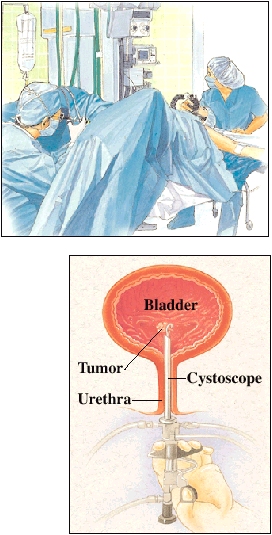Cystoscopy is a way for your doctor to look into your bladder. A small telescope with a camera attached is used. This is called a cystoscope. Problems of the urinary tract can be diagnosed and sometimes treated with cystoscopy. If cancer is found and it is in an early stage (superficial) and is growing slowly (low grade), it may be removed during this procedure. Removal of a tumor during cystoscopy is known as transurethral resection (TUR). Most of the time, tissue removed during TUR can be studied to see if more treatment is needed.
Removing a Tumor
TUR is most often done in a hospital as an outpatient procedure. If the tumor is large, you may stay overnight. You will be given medication so you don’t feel pain during the procedure. This is called anesthesia. If you have regional anesthesia, just the lower part of your body is numbed. You may also be drowsy. If you have general anesthesia, you will be in a state like deep sleep throughout the procedure.
During the Procedure
A cystoscope is passed through your urethra and into your bladder. The bladder is examined through the

scope. If tumors are found, they are removed if possible. A cutting tool is put through the scope to do this. A biopsy (sample) of cells from the tumor and normal-looking tissue may be taken. These samples are looked at under a microscope. This is done to rule out cancer. In some cases, a laser is used to burn a tumor away. The laser destroys tissue, so none is left for biopsy.
After the Procedure
- After the procedure, a catheter (thin, flexible tube) may be placed in your bladder. This drains the bladder of urine while you heal. The tube may stay in place for a few days.
- Bladder tumors can come back (recur) after treatment. To be sure that all cancer cells are destroyed, TUR may be followed by other types of treatment, such as intravesical therapy. This uses special medications placed in the bladder to destroy cancer cells.
Risks and Possible Complications of TURAll procedures have risks. Risks of TUR include:
|
